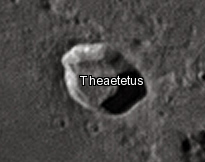|
Theaetetus (other) (Θεαίτητος ὁ σχολαστικός) (fl. 6th century AD), Greek poet
{{disambiguation, hndis ...
Theaetetus (Θεαίτητος) is a Greek name which may refer to: * Theaetetus (mathematician) (c. 417 BC – 369 BC), Greek geometer * ''Theaetetus'' (dialogue), a dialogue by Plato, named after the geometer * Theaetetus (crater), a lunar impact crater * Theaetetus (poet) (fl. 3rd century BC), Greek poet * Theaetetus of Cyrene (Θεαίτητος ὁ Κυρηναῖος) (fl. 270 BC), Greek poet * Theaetetus Scholasticus Theaetetus Scholasticus ( gr, Θεαίτητος Σχολαστικός, Theaítētos Scholastikos; fl. 6th century AD) was a Byzantine Greek epigrammatist. Theaetetus was of the time of Justinian, as is clearly proved by the references in h ... [...More Info...] [...Related Items...] OR: [Wikipedia] [Google] [Baidu] |
Theaetetus (mathematician)
Theaetetus of Athens (; grc-gre, Θεαίτητος; c. 417 – c. 369 BC), possibly the son of Euphronius of the Athenian deme Sunium, was a Greek mathematician. His principal contributions were on irrational lengths, which was included in Book X of Euclid's ''Elements'' and proving that there are precisely five regular convex polyhedra. A friend of Socrates and Plato, he is the central character in Plato's eponymous Socratic dialogue. Theaetetus, like Plato, was a student of the Greek mathematician Theodorus of Cyrene. Cyrene was a prosperous Greek colony on the coast of North Africa, in what is now Libya, on the eastern end of the Gulf of Sidra. Theodorus had explored the theory of incommensurable quantities, and Theaetetus continued those studies with great enthusiasm; specifically, he classified various forms of irrational numbers according to the way they are expressed as square roots. This theory is presented in great detail in Book X of Euclid's ''Elements''. Theae ... [...More Info...] [...Related Items...] OR: [Wikipedia] [Google] [Baidu] |
Theaetetus (dialogue)
The ''Theaetetus'' (; el, Θεαίτητος) is one of Plato's dialogues concerning epistemology, written BCE. In this dialogue set in a wrestling school, Socrates and Theaetetus discuss three definitions of knowledge: knowledge as nothing but ''perception'', knowledge as ''true judgment'', and, finally, knowledge as a '' true judgment with an account.'' Each of these definitions is shown to be unsatisfactory. Socrates declares Theaetetus will have benefited from discovering what he does not know, and that he may be better able to approach the topic in the future. The conversation ends with Socrates' announcement that he has to go to court to face a criminal indictment. The framing of the dialogue The dialogue is framed by a brief scene in which Euclid of Megara tells his friend Terpsion that he has a written record of a dialogue between Socrates and Theaetetus, which occurred when Theaetetus was quite a young man. This dialogue is then read aloud to the two men by a sl ... [...More Info...] [...Related Items...] OR: [Wikipedia] [Google] [Baidu] |
Theaetetus (crater)
Theaetetus is a lunar impact crater that is located to the southeast of the crater Cassini near the eastern edge of Mare Imbrium. It was named after the ancient Greek mathematician Theaetetus. It lies just to the west of the Montes Caucasus range, which forms the eastern shore of the mare. To the southwest is the prominent crater Aristillus. The rim of Theaetetus is distinctly polygonal in shape, with a slight rounding at the vertices. There is a low outer rampart and a slight central rise on the crater floor, which is offset to the northeast of the crater midpoint. The interior is otherwise relatively featureless. This crater has been noted in the past as a site of possible transient lunar phenomena. In 1902, a white cloud was observed briefly in the vicinity of the crater. Other observers, including Patrick Moore and W. H. Pickering William Henry Pickering (February 15, 1858 – January 16, 1938) was an American astronomer. Pickering constructed and established seve ... [...More Info...] [...Related Items...] OR: [Wikipedia] [Google] [Baidu] |
Theaetetus (poet)
Theaetetus (Greek: Θεαίτητος, Theaítētos; fl. 3rd century BC) was a poet of the Greek Anthology. Of Theaetetus the poet, we only know with certainty that he lived at or after the time of the Academic philosopher Crantor, his epitaph upon whom is preserved by Diogenes Laertius. Crantor flourished about Olympiad 116, 316 BC. Six epigrams of Theaetetus are contained in the ''Greek Anthology''; another is by the later Theaetetus Scholasticus.Brunck, ''Anal.'' vol. ii. p. 251, vol. iii. p. 131, ''Lection.'' p. 189; Jacobs, ''Anth. Graec.'' vol. ii. p. 227, vol. xiii. p. 957; Fabricius, ''Bibl. Graec.'' vol. iv. p. 496. References Bibliography * Folkerts, Menso; Albiani, Maria Grazia (2006)"Theaetetus (2)" In Salazar, Christine F. (ed.). '' Brill's New Pauly''. Accessed 14 February 2022. * Smith, Philip (1867)"Theaetetus (3)" In Smith, William (ed.) ''Dictionary of Greek and Roman Biography and Mythology The ''Dictionary of Greek and Roman Biography and Mythology' ... [...More Info...] [...Related Items...] OR: [Wikipedia] [Google] [Baidu] |
Theaetetus Of Cyrene
Theaetetus of Cyrene (; grc-gre, Θεαίτητος ὁ Κυρηναῖος) was a Greek poet who flourished in the 3rd century BC. Theaetetus is mentioned in an epigram by Callimachus, a fellow native of Cyrene. In Epigram 7 (in the edition of Pfeiffer), Callimachus writes: ἦλθε Θεαίτητος καθαρὴν ὁδόν. εἰ δ᾽ ἐπὶ κισσὸν τὸν τεὸν οὐχ αὕτη, Βάκχε, κέλευθος ἄλει, ἄλλων μὲν κήρυκες ἐπὶ βραχὺν οὔνομα καιρὸν φθέγξονται, κείνου δ᾽ Ἑλλὰς ἀεὶ σοφίην. ''Theaetetus travelled a splendid path. If that path, Bacchus, leads not to thine ivy wreath - other men's names the heralds will voice a little while, but his skill Hellas will voice for ever.'' The "ivy wreath" Callimachus mentions is the prize for dramatic competitions, from which it is possible to deduce that Theaetetus composed dramatic works. There is no reason to suspect, ... [...More Info...] [...Related Items...] OR: [Wikipedia] [Google] [Baidu] |
